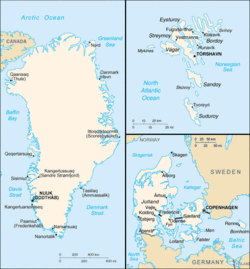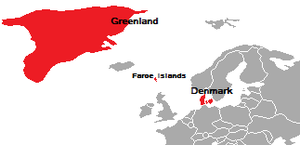- Kingdom of Denmark
-
For the country within the kingdom, see Denmark.
Kingdom of Denmark Kongeriget Danmark (Danish)
Kongsríki Danmarkar (Faroese)
Kunngeqarfik Danmarki (Kalaallisut)
Flag Denmark, Greenland, and the Faroe IslandsCapital
(and largest city)Copenhagen
55°43′N 12°34′E / 55.717°N 12.567°EOfficial language(s) Danish, Faroese, Greenlandic Government Parliamentary democracy and Constitutional monarchy - Monarch Queen Margrethe II Area - Total 2,220,093 km2 (12th)
1,370,000 sq miPopulation - 1 October 2008 estimate 5,671,050 (110th) - Density 2.5/km2 (236th)
6.5/sq miCurrency Danish krone, Faroese króna ( DKK)Drives on the right ISO 3166 code DK Calling code +45 (Denmark), +298 (Faroes), +299 (Greenland) The Kingdom of Denmark (Danish: Kongeriget Danmark, pronounced [ˈkɔŋəʁiːəð ˈdanmɑɡ̊] (
 listen), Faroese: Kongsríki Danmarkar, Kalaallisut: Kunngeqarfik Danmarki) or the Danish Realm (Danish: Danmarks Rige), is a constitutional monarchy and sovereign state consisting of Denmark proper in northern Europe and two autonomous constituent countries, the Faroe Islands in the North Atlantic and Greenland in North America. Denmark is the hegemonial part, where the residual judicial, executive and legislative power rests.[1] According to the Faroese home rule act, the Faroe Islands constitutes a community of people within the kingdom.[note 1] The Greenlandic self-government act does not contain a similar definition, but instead describes the Greenlandic people as a people as defined in international law with the right to self-determination.[note 2]
listen), Faroese: Kongsríki Danmarkar, Kalaallisut: Kunngeqarfik Danmarki) or the Danish Realm (Danish: Danmarks Rige), is a constitutional monarchy and sovereign state consisting of Denmark proper in northern Europe and two autonomous constituent countries, the Faroe Islands in the North Atlantic and Greenland in North America. Denmark is the hegemonial part, where the residual judicial, executive and legislative power rests.[1] According to the Faroese home rule act, the Faroe Islands constitutes a community of people within the kingdom.[note 1] The Greenlandic self-government act does not contain a similar definition, but instead describes the Greenlandic people as a people as defined in international law with the right to self-determination.[note 2]The kingdom is a unitary state with some power being devolved from Denmark to Greenland and the Faroe Islands; this federacy is referred to as Rigsfællesskabet.[4] One of the results of this arrangement is that Denmark is a member of the European Union while both Greenland and the Faroe Islands have opted to remain outside of the EU. Each country is a member of the Nordic Council where they function independently.
Country Population Area (km²) Density (Pop per km²)  Denmark
Denmark5,564,219 43,094 129  Faroe Islands
Faroe Islands49,267 1,399 35  Greenland
Greenland57,564 2,175,600 0.026  Kingdom of Denmark
Kingdom of Denmark5,671,050 2,220,093 2.6 Contents
History
During the 8th–11th centuries, the Norse discovered and settled the Hebrides, Shetland, Orkney, the Faroe Islands, Iceland, Greenland and attempted to establish a settlement in Vínland, believed to be at L'Anse aux Meadows in Newfoundland. They also conquered and settled parts of England (the Danelaw), Ireland, and Normandy, and founded the Kievian Rus' in the east. The Norse ran trade routes from Greenland in the north to Constantinople in the south via Russian rivers. Denmark-Norway was formed as a state in 1536, following a personal union of Denmark and Norway.
The Dano-Norwegian union was dissolved by the Treaty of Kiel in 1814, with Denmark keeping the Norwegian dependencies of Iceland, the Faroe Islands, and Greenland. Denmark also ruled over Danish India (notably Tranquebar) from 1620 to 1869, the Danish Gold Coast (Ghana) from 1658 to 1850, and the Danish West Indies (the U.S. Virgin Islands) from 1671 to 1917.
Iceland achieved home rule in 1874, and became a fully sovereign state in 1918, united with Denmark under a common king. The Icelanders abolished the monarchy in 1944, and in 1948 the Faroese gained home rule. The kingdom joined the European Economic Community (now the European Union) without the Faroes in 1973, and Greenland withdrew in 1985, in both cases because of fisheries policies. Greenland gained home rule in 1979 and a proposal for introducing further autonomy in 2009 was approved in a referendum in 2008. Greenlanders consider independence if enough natural resources are discovered to make that prospect economical.
Government and politics
The Folketing is the Danish national legislature. The Folketing consists of 175 members elected by proportional majority from Denmark, plus two members each elected from Greenland and the Faroe Islands. General elections are held at least every four years, but it is within the powers of the Prime Minister to call one at his discretion before this period has elapsed.
Additionally, the Faroe Islands and Greenland were granted home rule in 1948 and 1979 respectively. As well as electing two members each to the Danish parliament, Greenland has a legislature, the Landsting (or Inatsisartut in Kalaallisut), which consists of 31 seats and the Faroes have a parliament known as the Løgting which consist of a fixed 33 members.
Greenland and the Faroes are represented in Denmark by their High Commissioners (Danish: Rigsombudsmand) who inform the Danish Prime Minister of relevant discussions in the home rule parliaments.
The Constitution of Denmark of 1953 is that of a unitary state and applies to all three regions, and the home rule and self-rule agreements are not enshrined in the constitution. Both the Faroe Islands and Greenland manage most of their own internal affairs. They may also conclude international agreements on behalf of the Danish realm, if these concern only their own part of the realm.
Geography
Phytogeographically, Denmark, as well as Greenland and the Faroe Islands, belongs to the Boreal Kingdom and is shared between the Arctic, Atlantic European and Central European provinces of the Circumboreal Region. According to the WWF, the territory of Denmark can be subdivided into two ecoregions: the Atlantic mixed forests and Baltic mixed forests. The Faroe Islands are covered by the Faroe Islands boreal grasslands, while Greenland hosts the ecoregions of Kalaallit Nunaat high arctic tundra and Kalaallit Nunaat low arctic tundra.
The Kingdom of Denmark is the only state in the world to have a majority of its land area north of the Arctic Circle.
See also
- Rigsfællesskabet (Commonwealth of the Realm), a more detailed description of the relationship between Denmark, Greenland and the Faroe Islands.
Endnotes
- ^ The Faroese home rule §1: "The Faroe Islands constitute a self-governing community of a people within the Kingdom of Denmark within the framework of this law..."[2]
- ^ The Greenlandic self-government act: "In recognition of the fact that the people of Greenland constitutes a people in international law with the right to self-determination, the law builds on a wish to promote equality and mutual respect in the partnership between Denmark and Greenland."[3]
References
- ^ Harhoff, Frederik (1993) Rigsfællesskabet (Realm) (in Danish with English summary). Århus: Klim, p. 498. ISBN 87-7724-335-8
- ^ Lov om Færøernes Hjemmestyre (Danish). Retsinformation.dk. "§ 1. Færøerne udgør inden for denne Lovs Rammer et selvstyrende Folkesamfund i det danske Rige. I Henhold hertil overtager det færøske Folk ved sin folkevalgte Repræsentation, Lagtinget, og en af dette oprettet Forvaltning, Landsstyret, inden for Rigsenheden Ordningen og Styrelsen af færøske Særanliggender som angivet i denne Lov."
- ^ Lov om Grønlands Selvstyre (Danish). Retsinformation.dk. "I erkendelse af, at det grønlandske folk er et folk i henhold til folkeretten med ret til selvbestemmelse, bygger loven på et ønske om at fremme ligeværdighed og gensidig respekt i partnerskabet mellem Danmark og Grønland.
- ^ Skou, Kaare R. (2005) Dansk politik A-Å (in Danish). Aschehoug, p. 578. ISBN 87-11-11652-8
Categories:- Denmark
- Greenland
- Faroe Islands
- Danish-speaking countries
- Danish monarchy
- Constitutional monarchies
Wikimedia Foundation. 2010.



